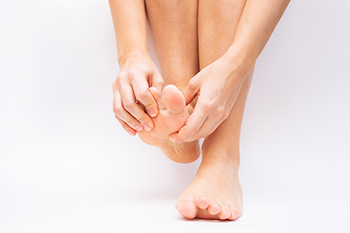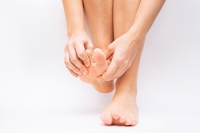
The most common form of toe pain occurs in the big toe. This joint takes a lot of abuse, as it absorbs most of the body weight with each step you take. The two main big toe complaints are gout and bunions. Less frequent causes are turf toe, and ingrown toenails. Toe pain to the smaller toes is most often caused by hammertoes and claw toes. Gout is an inflammatory disease that attacks the joints, causing redness, swelling and extreme pain. It is connected to a buildup of uric acid that crystalizes and induces pain. Bunions are a deformity at the base of the big toe, usually passed on genetically but made worse by ill-fitting footwear. It causes the toe to push outward at the base and inward at the top. It can adversely affect the biomechanics of the foot, causing other foot problems. Turf toe is common to football and basketball players, and dancers, who frequently push off the ground and hyper-extend their big toe. Ingrown toenails develop when the nail grows into the nailbed. Pressure from tight shoes can irritate the area, causing pain. Hammertoe and claw toe are painful deformities that affect the joints, tendons and soft tissues of the smaller toes. For help with any toe pain conditions you may be experiencing, it is suggested that you consult with a podiatrist.
Toe pain can disrupt your daily activities. If you have any concerns, contact Dr. Kenneth Donovan of Advanced Care Foot and Ankle. Our doctor can provide the care you need to keep you pain-free and on your feet.
What Causes Toe Pain?
Most severe toe pain is caused due to a sports injury, trauma from dropping something heavy on the toe, or bumping into something rigid. Other problems can develop over time for various reasons.
Toe pain can be caused by one or more ailments. The most common include:
- Trauma
- Sports injury
- Wearing shoes that are too tight
- Arthritis
- Gout
- Corns and calluses
- Hammertoe
- Bunions
- Blisters
- Ingrown toenails
- Sprains
- Fractures (broken bones)
- Dislocations
When to See a Podiatrist
- Severe pain
- Persistent pain that lasts more than a week
- Signs of infection
- Continued swelling
- Pain that prevents walking
Diagnosis
In many cases the cause of toe pain is obvious, but in others, a podiatrist may want to use more advanced methods to determine the problem. These can range from simple visual inspections and sensation tests to X-rays and MRI scans. Prior medical history, family medical history, and any recent physical traumatic events will all be taken into consideration for a proper diagnosis.
Treatment
Treatments for toe pain and injuries vary and may include shoe inserts, padding, taping, medicines, injections, and in some cases, surgery. If you believe that you have broken a toe, please see a podiatrist as soon as possible.
If you have any questions please feel free to contact one of our offices located in Warren, Livingston, and Toms River, NJ . We offer the newest diagnostic tools and technology to treat your foot and ankle needs.

